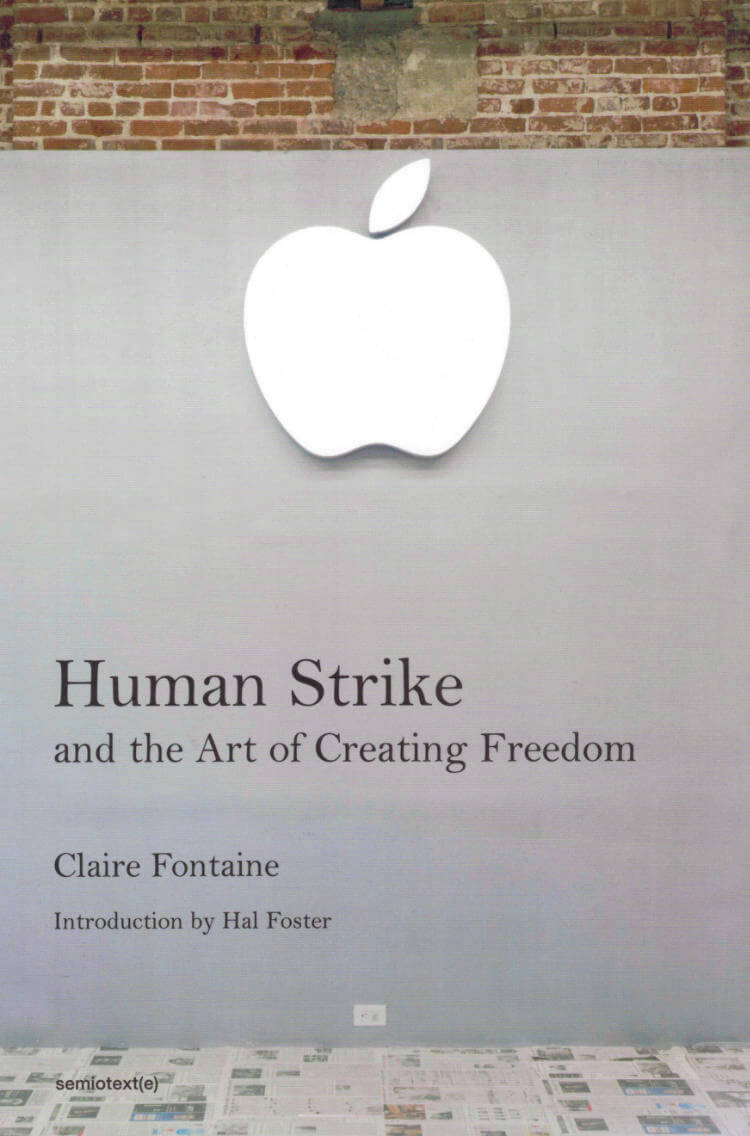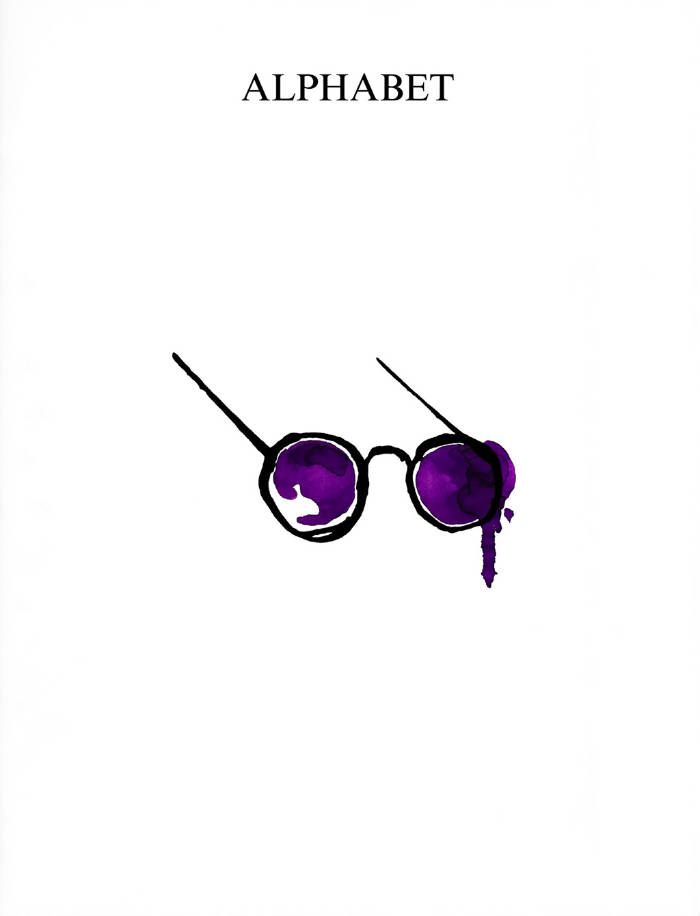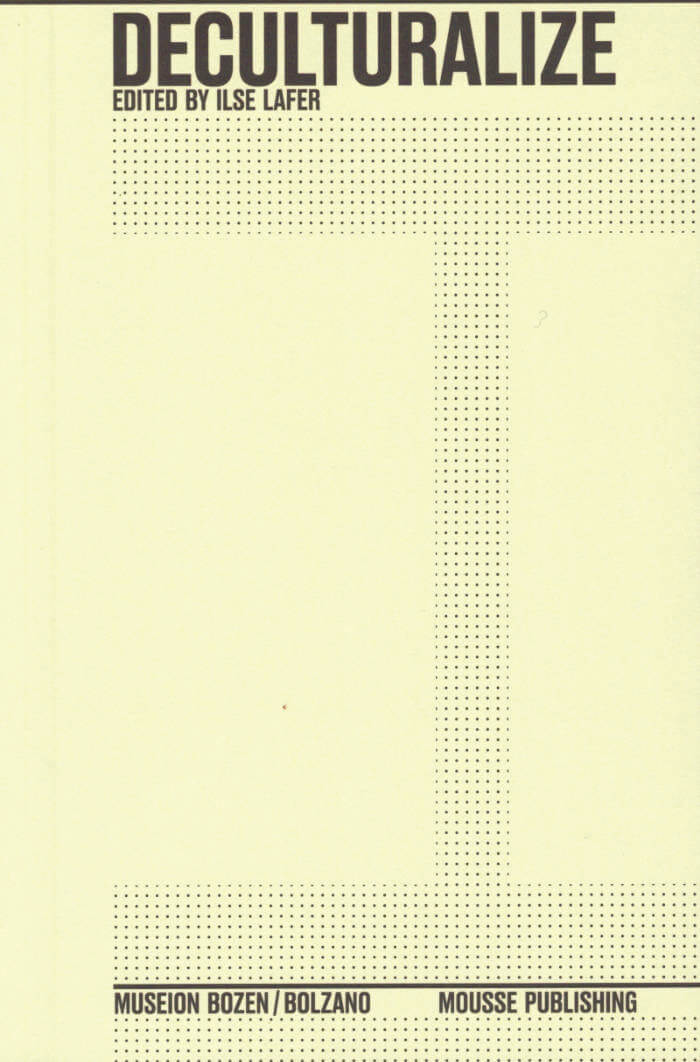Claire Fontaine
Claire Fontaine

A User's Manual to Claire Fontaine
In the first monograph on the feminist conceptual artist collective Claire Fontaine, political theorist and somatic practitioner Anita Chari explores the artist's theoretical and political innovations to illuminate a more haptic, embodied approach to the practice of critical theory.
A User's Manual to Claire Fontaine explores the work of the feminist conceptual artist collective Claire Fontaine through the lens of her theoretical and political innovations, both inside and outside the context of contemporary art. Theorizing the ways in which Claire Fontaine's experimental approach can illuminate a more haptic, embodied practice of critical theory, this book delineates a series of theoretical techniques and procedures at the core of the artist's work, among them defunctionalization, Institutional Critique, human strike, tactile mimesis, desubjectivation, détournement, magic materialism, and feminist materialism.
Political theorist and somatic practitioner Anita Chari illuminates a larger field of practice for those working within the world of critical theory with this "user's manual" that seeks to reinvest theory with use value, drawing on the resources of critical contemporary art to engage with critical theory in ways that can become embodied, sensate, and tactile, and thus inform contemporary political practices.
"Fluently traversing critical theory, political philosophy, and artistic discourse, this is a brilliant, engaging book on the art and writings of Claire Fontaine—'readymade artist' and conceptual provocateur—as well as a vital elucidation of paths toward a transformative mode of living in the present. Writing with and through rather than, as usual, 'on' her subject, Chari provides her readers with a 'how-to' manual to Claire Fontaine's practice, finding in it a model for embodied resistance."—Tom McDonough, author of The Beautiful Language of My Century
Anita Chari is a political theorist and writer based in Portland, Oregon and is Associate Professor of Political Science at the University of Oregon. Her work explores the significance of aesthetics, artistic practices, and embodiment for critical theory and practice.
Claire Fontaine is a feminist, conceptual artist, founded in Paris in 2004.

Human Strike and the Art of Creating Freedom
The first English-language publication of writings by the collective artist Claire Fontaine, addressing our complicity with anything that limits our freedom.
This anthology presents, in chronological order, all the texts by collective artist Claire Fontaine from 2004 to today. Created in 2004 in Paris by James Thornhill and Fulvia Carnevale, the collective artist Clare Fontaine creates texts that are as as experimental and politically charged as her visual practice. In. these writings, she uses the concept of "human strike" and adopts the radical feminist position that can be found in Tiqqun, a two-issue magazine cofounded by Carnevale.
Human strike is a movement that is broader and more radical than any general strike. It addresses our inevitable subjective complicity with everything that limits our freedom and shows how to abandon these self-destructive behaviors through desubjectivization. Human strike, Claire Fontaine writes, is a subjective struggle to separate from the inevitable harm we do to ourselves and others simply by living within postindustrial neoliberalism. Human Strike is the first English-language publication of Claire Fontaine's influential and important theoretical writings.
And more

Diversity of Aesthetics
Jose Rosales, Andreas Petrossiants
Critical conversations and reflections about lessons learned at the intersection of social movements and artist production.
Diversity of Aesthetics collects powerful and timely conversations among leading cultural critics, artists, and organizers to connect the threads between some of the most pressing social struggles and conflicts of our time: policing, war, borders and migration, economic crisis.
Across three themes—infrastructure, migration, and riots—militant thinkers, artists, educators, and others discuss aesthetic production, forms of social organization, modes of struggle against gendered and racialized capitalism, and revolutionary theory. Common to all three conversations is a commitment to rethinking the relationship between forms of critique and forms of struggle undertaken by collective social practices, offering lessons for tactics, strategies, and practices.
With contributions by Claire Fontaine, Iman Ganji, Saidiya Hartman, Vicky Osterweil, Andreas Petrossiants, Christina Sharpe, Stevphen Shukaitis, Michael Rakowtiz, Shellyne Rodriguez, Jose Rosales, Rinaldo Walcott, Andreas Petrossiants, Jose Rosales
Andreas Petrossiants is a writer and associate editor of e-flux journal. His work has appeared in Historical Materialism, Social Text, New Inquiry, AJ+ Subtext, Frieze, Bookforum.com, Roar Magazine, the Verso blog, the Brooklyn Rail, Hyperallergic. He is a PhD candidate in performance studies at NYU where he is researching anti-eviction, squatting, and tenants’ movements as they relate to the production of social space.
Jose Rosales is an independent researcher and journalist based in Lisbon, Portugal. His work has appeared in e-flux notes, Lumpen: A Journal of Poor and Working Class Writers, and has contributed a chapter called “Communism As the Riddle Posed to History” in Double Binds of Neoliberalism (2022).

Folio G: Gendered Labour and Clitoridean Revolt
Jaleh Mansoor, Sara Colantuono and 1 more
Folio G presents new translations of significant texts by two poles of Italian feminist thought—Leopoldina Fortunati and Carla Lonzi—to examine the “unexpected subject” of women in society and history. These texts are accompanied by contextual essays that explore the reverberation of their thought in contemporary artistic practice, theory, and models of creating freedom for women in everyday life.
New translations of texts by:
Leopoldina Fortunati
Carla Lonzi
Rivolta Femminile
Additional contributions by:
Sara Colantuono
Claire Fontaine
Maya Gonzalez
Matilde Guidelli-Guidi
Jaleh Mansoor
Giovanna Zapperi

Alphabet Magazine #01
The first issue of the magazine made by artists, founded by Donatien Grau and Thomas Lenthal. Contributions by Mathias Augustyniak, Naomi Campbell, Théo Casciani, Michael Chow, Pan Daijing, Es Devlin, Claire Fontaine, Edwin Frank, Theaster Gates, Nicolas Godin, Alejandro Jodorowsky, Hedi El Kholti, Michèle Lamy, Paul McCarthy, Ian McEwan, Eileen Myles, Marc Newson, Hans Ulrich Obrist, Diana Widmaier Picasso, Ariana Reines, Barbara Chase-Riboud, Julian Schnabel & Jason Momoa, Hanna Schygulla, Juergen Teller, Iké Udé, McKenzie Wark, Robert Wilson, Yohji Yamamoto.
Alphabet is the artists' magazine. Here, they run the show. They write, they make images, they select their own works, they interview the figures they admire, they tell us what we did not know about them nor could have ever fathomed about life. This magazine is conceived entirely to put them in the driver's seat, and to enable readers to become part of the unique vision of some of today's greatest luminaries.
It is a manifestation of the creative community, coming together from all fields, from all generations and threads of culture. Writers, musicians, designers, painters, sculptors, poets—artistic figures of every kind converse all the time in their lives, but they did not have a shared space for their editorial projects. This is it.
Everyone who finds their way into Alphabet has made a mark on life, art, and culture, in a way that signals their importance to the present. Some of the contributors may be world famous, others well respected, others on the way to becoming the legends they already are. Their relevance to culture is the same, and that is why they all belong here, in the endeavor of the creative community. There is no hierarchy of status, or domain, or apparent impact. Some of the greatest revolutions happen undercover. Some of the most established voices are still breaking ground. The magazine's premise is simple: the old opposition between pop and underground does not make sense anymore. There are many creative communities, each following its own rules, each inventing its own space. Here, wherever they come from, whatever their community, artists can exist together, with the same intention of changing, and improving, what life is; with the same belief that art matters more than anything else.
None of the contributors is here randomly. They keep life thrilling and exhilarating, challenge the perception of everything and anything. Their role in shaping every aspect of life can hardly be overstated. That is why they needed a place to elaborate their own alphabet, their way of ordering and structuring language, the world, and the fabric of life—a place of freedom, where everything would be done to highlight their visions, where the very design would be a shrine to their magic. Even the distribution of the magazine was conceived with artists—each contributor suggesting sites of their liking.
Alphabet is also the magazine of magazines. Here, readers find essays, fictions, poetry, visual projects, DIY methods, recommendations from those who know, even games and astrology—and an artist's alphabet, articulating an entire universe. Anything that has ever formed a section of a magazine could find its way here. Even the cover is conceived by an artist: it was conceived especially by the legendary Robert Wilson. Artists will rejuvenate what magazines are, and magazines will be kept forever young by and with them.
Founded by Donatien Grau and Thomas Lenthal, Alphabet is a bi-yearly art magazine. Not a magazine about art. It's a magazine made by artists. Each contribution like an œuvre, making it the ultimate collector piece. Each cover is designed, with the word Alphabet, by a different artist, initiating a cult series.

Vogliamo Tutto – Cultural Practices and Labor
Nicola Ricciardi, Samuele Piazza
Vogliamo Tutto. Cultural Practices and Labor has its origin in the novel Vogliamo tutto (1971) by Nanni Balestrini, whose protagonist Alfonso Natella became the voice of an entire generation as well as the workers' movements in 1968 Turin. In 2021, thirteen artists were invited to reflect on the change of labor in the contemporary context.
The result is a sum of choral voices and practices, which together outline the peculiar transformative nature of labor and its socio-cultural context over a wide time span: from the impact of the Industrial Revolution to the post-industrial decline and the shifts of the digital era.
The book features two essays by Samuele Piazza and Nicola Ricciardi, curators of the eponymous exhibition at OGR Torino; new writing by the artists Claire Fontaine and Tyler Coburn; and archive texts selected by the artists in the show: Andrea Bowers, Pablo Bronstein, Claire Fontaine, Tyler Coburn, Jeremy Deller, Kevin Jerome Everson, LaToya Ruby Frazier, Elisa Giardina Papa, Liz Magic Laser, Adam Linder, Sidsel Meineche Hansen, Mike Nelson, and Renate Wiehager for Charlotte Posenenske.
The archive texts include the essays "Automation and the Invisible Service Function" by Neda Atanasoski and Kalindi Vora; "Audio Poverty"Diedrich Diederichsen; "Sabotage" by Elizabeth Gurley Flynn; "Wages Against Housework" by Silvia Federici; "The Wreck of the Sea-Venture" by Peter Linebaugh and Marcus Rediker; "Charlotte Posenenske Mimetic Minimalism and Practicability" by Renate Wiehager; an excerpted texts from The Human Animal by Émile Zola; as well as the articles "A Game Designer's Analysis of QAnon" by Reed Berkowitz; "Manage Your Energy, Not Your Time" by Tony Schwartz and Catherine McCarthy; the "Letter of Protest, Frieze Art Fair, New York" by Andrea Bowers, and the "License Agreement" by the Cultural Capital Cooperative collective; the script from Erie by Kevin Jerome Everson; a conversation between David Green and Rick Smith, UAW Local 1112, and LaToya Ruby Frazier.
Contributions from Samuele Piazza, Nicola Ricciardi, Tyler Coburn, Claire Fontaine.
Reprinted archive texts by Neda Atanasoski & Kalindi Vora, Diedrich Diederichsen, Silvia Federici, Peter Linebaugh & Marcus Rediker, Renate Wiehager, Reed Berkowitz, Tony Schwartz & Catherine McCarthy, Andrea Bowers, the Cultural Capital Cooperative.

École nationale supérieure des beaux-arts de Lyon
Initiales #05 — Andrea Fraser
Claire Moulène, Emmanuel Tibloux
Le cinquième numéro de la revue d'art et de recherche « rétro-prospective » est consacré à l'artiste et performeuse Andrea Fraser, figure clé de l'art des années 1990 et 2000 et du courant de la « critique institutionnelle » (une monographie complétée par une grande enquête sur l'espace critique réalisée auprès d'une cinquantaine d'artistes, critiques et philosophes internationaux).
Avec contributions de Kader Attia, Eva Barto, Sophie Bonnet-Pourpet, Marie de Brugerolle, Gregory Buchert, Daniel Buren, Marie Canet, Gregory Castéra, Inès Champey, Thierry Chancogne, Claire Fontaine, François Cusset, Judith Deschamps, Paul Devautour, Philippe Durand, Joao Enxuto & Erica Love, Andrea Fraser, Nicolas Frespech, Dora García, Romain Grateau, Emmanuel Guez, Thomas Hirschhorn, Aliocha Imhoff & Kantuta Quirós, Béatrice Josse, Franck Larcade, Ju Huyn Lee, Sven Lütticken, Fabrice Mabime, Bartomeu Mari, Chus Martínez, Gwenael Morin, Claire Moulène, Jean-Luc Moulène, Yan Moulier Boutang, Vincent Normand, François Pain, Gerald Petit, Anne Querrien, Thierry Raspail, Sinziana Ravini, Delphine Reist & Laurent Faulon, Christophe de Rohan Chabot, Phillippe Roux, Jean-Baptiste Sauvage, Thomas Schlesser, Ida Soulard, Fabien Steichen, Michel Surya, Emmanuel Tibloux, Vier 5, Ulf Wuggenig, Italo Zuffi.

Self-portrait
Allison Grimaldi Donahue, Carla Lonzi
Recorded and transcribed throughout the 1960s, Carla Lonzi’s Self-portrait ruptures the narration of post-war modern art in Italy and beyond. Artmaking struck Lonzi as an invitation to be together in a ‘humanly satisfying way’, and this experiment in art-historical writing is a testament to her belief. Lonzi abolishes the role of the critic, her own, seeking change over self-preservation by theorising against the act of theorising.
The life and work of Carla Lonzi (1931–1982) is inseparable from the cultural, political, and social history of Italy in the decades following the Second World War; she occupies a singular position, which today merits reevaluation. A reputed art critic of the 1960s artistic scene, both friend and collaborator of such figures as Carla Accardi, Luciano Fabro, Giulio Paolini, and Jannis Kounellis, she wrote “Autoportrait” in 1969, a “love letter” to the artists and to creation, but also a farewell chorus to art criticism and the art world. The following year she founded Rivolta Femminile, an active feminist collective, thus becoming the central figure of Italian feminism.
Interviews with Carla Accardi, Getulio Alviani, Enrico Castellani, Pietro Consagra, Luciano Fabro, Lucio Fontana, Jannis Kounellis, Mario Nigro, Guilio Paolini, Pino Pascali, Mimmo Rotella, Salvatore Scarpita, Guilio Turcato, Cy Twombly.
Afterword by Claire Fontaine.
Translated by Allison Grimaldi Donahue.
978-1916425088
105 b&w illustrations
21.6 x 13.9 cm
364 p.
Paperback
November 2021

Deculturalize
The radical feminist practice of the Italian art historian, art critic, poet, and feminist Carla Lonzi (1931–1982) and its potential relationship to both historical and contemporary art practices offers the contextual framework for the publication Deculturalize.
Lonzi's recurring demand for deculturizzazione, echoed in the book's title, is based on her proclamation that women's inclusion in society must be understood as a constant colonization. Their ensuing "impotence, lack of history, lack of culture" and "insignificance" can thus only be abolished through the establishment of an "unexpected" (female) subjectivation. Rather than continuing to be the object of historical-social power dynamics, women must become the subject of their own life practices through their continuous withdrawal from (patriarchal) norms.
The book's authors explore if and to what degree Lonzi's radical feminist approach is based on art terms and concepts, or historical or contemporary art practices. The motivation was the exhibition Doing Deculturalization, presented at Museion, Bolzano, in 2019, and the related desire to address the (historically ambivalent) relationship between (Italian) female art and the formation of feminist theory.
Essays by Sabeth Buchmann, Laura Iamurri, Marco Scotini and Elvira Vannini, and Giovanna Zapperi focus on this by analyzing works by women artists whose practices are related to Lonzi's deculturizzazione concept. The contributions by artists Claire Fontaine, Ariane Müller, Margherita Morgantin (in conversation with Lia Cigarini) and Suzanne Santoro (in conversation with Ilse Lafer) present specific reflections on Lonzi's feminist legacy, which is always related to the individual artist's own artistic-feminist practice. Juxtaposed with these are philosophical and analytical concepts developed by Marc Rölli and Annarosa Buttarelli, who reconstruct Lonzi's theory of deculturizzazione based on its historical reference points and update it for the present.
With texts by Sabeth Buchmann, Annarosa Buttarelli, Claire Fontaine, Laura Iamurri, Ilse Lafer, Margherita Morgantin & Lia Cigarini, Ariane Müller, Letizia Ragaglia, Marc Rölli, Suzanne Santoro & Ilse Lafer, Marco Scotini & Elvira Vannini, Giovanna Zapperi.
Trilingual edition (English / German / Italian)